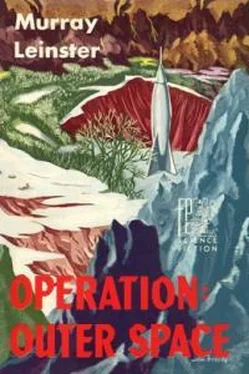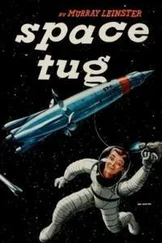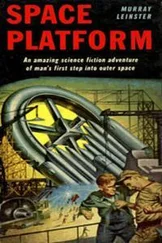Jones rode back to Lunar City with Cochrane and Holden and Babs. His face was dead–pan.
Babs tried to recover the mien and manner of the perfect secretary.
"Mr. Cochrane," she said professionally, "will you want to read the publicity releases Mr. Bell turns out from what Mr. West and Mr. Jamison tell him?"
"I don't think it matters," said Cochrane. "The newsmen will pump West and Jamison empty, anyhow. It's all right. In fact, it's better than our own releases would be. They'll contradict each other. It'll sound more authentic that way. We're building up a customer–demand for information."
The small moon–jeep rolled and bumped gently down the long, improbable highway back to Lunar City. Its engine ran smoothly, as steam–engines always do. It ran on seventy per cent hydrogen peroxide, first developed as a fuel back in the 1940s for the pumps of the V2 rockets that tried to win the Second World War for Germany. When hydrogen peroxide comes in contact with a catalyst, such as permanganate of potash, it breaks down into oxygen and water. But the water is in the form of high–pressure steam, which is used in engines. The jeep's fuel supplied steam for power and its ashes were water to drink and oxygen to breathe. Steam ran all motorized vehicles on Luna.
"What are you thinking about, Jones?" asked Cochrane suddenly.
Jones said meditatively:
"I'm wondering what sort of field–strength a capacity–storage system would give me. I boosted the field intensity this time. The results were pretty good. I'm thinking—suppose I made the field with a strobe–light power–pack—or maybe a spot–welding unit. Even a portable strobe–light gives a couple of million watts for the forty–thousandth of a second. Suppose I fixed up a storage–pack to give me a field with a few billion watts in it? It might be practically like matter–transmission, though it would really be only high–speed travel. I think I've got to work on that idea a little … "
Cochrane digested the information in silence.
"Far be it from me," he said presently, "to discourage such high–level contemplation. Bill, what's on your mind?"
Holden said moodily:
"I'm convinced that the thing works. But Jed! You talk as if you hadn't any more worries! Yet even if you and Jones do have a way to make a ship travel faster than light, you haven't got a ship or the capital you need—."
"I've got scenery that looks like a ship," said Cochrane mildly. "Consider that part settled."
"But there are supplies. Air—water—food—a crew—. We can't pay for such things! Here on the moon the cost of everything is preposterous! How can you try out this idea without more capital than you can possibly raise?"
"I'm going to imitate my old friend Christopher Columbus," said Cochrane. "I'm going to give the customers what they want. Columbus didn't try to sell anybody shares in new continents. Who wanted new continents? Who wanted to move to a new world? Who wants new planets now? Everybody would like to see their neighbors move away and leave more room, but nobody wants to move himself. Columbus sold a promise of something that had an already–established value, that could be sold in every town and village—that had a merchandising system already set up! I'm going to offer just such a marketable commodity. I'll have freight–rockets on the way up here within twenty–four hours, and the freight and their contents will all be paid for!"
He turned to Babs. He looked more sardonic and cynical than ever before.
"Babs, you've just witnessed one of the moments that ought to be illustrated in all the grammar–school history–books along with Ben Franklin flying a kite. What's topmost in your mind?"
She hesitated and then flushed. The moon–jeep crunched and clanked loudly over the trail that led downhill. There was no sound outside, of course. There was no air. But the noise inside the moon–vehicle was notable. The steam–motor, in particular, made a highly individual racket.
"I'd—rather not say," said Babs awkwardly. "What's your own main feeling, Mr. Cochrane?"
"Mine?" Cochrane grinned. "I'm thinking what a hell of a funny world this is, when people like Dabney and Bill and Jones and I are the ones who have to begin operation outer space!"
Cochrane said kindly into the vision–beam microphone to Earth, "Cancel section C, paragraph nine. Then section b(1) from paragraph eleven. Then after you've canceled the entire last section—fourteen—we can sign up the deal."
There was a four–second pause. About two seconds for his voice to reach Earth. About two seconds for the beginning of the reply to reach him. The man at the other end protested wildly.
"We're a long way apart," said Cochrane blandly, "and our talk only travels at the speed of light. You're not talking from one continent to another. Save tolls. Yes or no?"
Another four–second pause. The man on Earth profanely agreed. Cochrane signed the contract before him. The other man signed. Not only the documents but all conversation was recorded. There were plugged–in witnesses. The contract was binding.
Cochrane leaned back in his chair. His eyes blinked wearily. He'd spent hours going over the facsimile–transmitted contract with Joint Networks, and had weeded out a total of six joker–stipulations. He was very tired. He yawned.
"You can tell Jones, Babs," he said, "that all the high financing's done. He can spend money. And you can transmit my resignation to Kursten, Kasten, Hopkins and Fallowe. And since this is a pretty risky operation, you'd better send a service message asking what you're to do with yourself. They'll probably tell you to take the next rocket back and report to the secretarial pool, I'm afraid. The same fate probably awaits West and Jamison and Bell."
Babs said guiltily:
"Mr. Cochrane—you've been so busy I had to use my own judgment. I didn't want to interrupt you—."
"What now?" demanded Cochrane.
"The publicity on the torp–test," said Babs guiltily, "was so good that the firm was worried for fear we'd seem to be doing it for a client of the firm—which we are. So we've all been put on a leave–with–expenses–and–pay status. Officially, we're all sick and the firm is paying our expenses until we regain our health."
"Kind of them," said Cochrane. "What's the bite?"
"They're sending up talent contracts for us to sign," admitted Babs. "When we go back, we would command top prices for interviews. The firm, of course, will want to control that."
Cochrane raised his eyebrows.
"I see! But you'll actually be kept off the air so Dabney can be television's fair–haired boy. He'll go on Marilyn Winter's show, I'll bet, because that has the biggest audience on the planet. He'll lecture Little Aphrodite Herself on the constants of space and she'll flutter her eyelashes at him and shove her chest–measurements in his direction and breathe how wonderful it is to be a man of science!"
"How'd you know?" demanded Babs, surprised.
Cochrane winced.
"Heaven help me, Babs, I didn't. I tried to guess at something too impossible even for the advertising business! But I failed! I failed! You and my official gang, then, are here with the firm's blessing, free of all commands and obligations, but drawing salary and expenses?"
"Yes," admitted Babs. "And so are you."
"I get off!" said Cochrane firmly. "Forward my resignation. It's a matter of pure vanity. But Kursten, Kasten, Hopkins and Fallowe do move in a mysterious way to latch onto a fast buck! I'm going to get some sleep. Is there anything else you've had to use your judgment on?"
"The contracts for re–broadcast of the torp–test. The original broadcast had an audience–rating of seventy–one!"
Читать дальше






